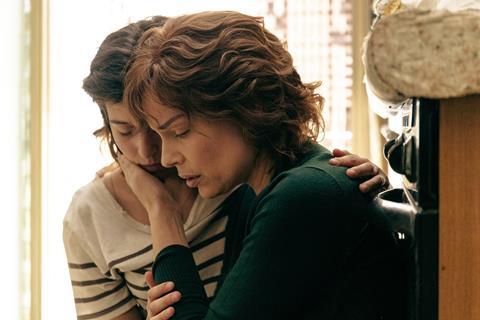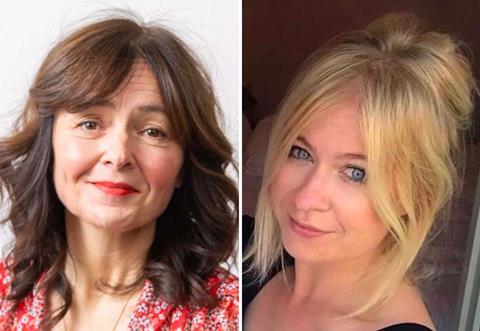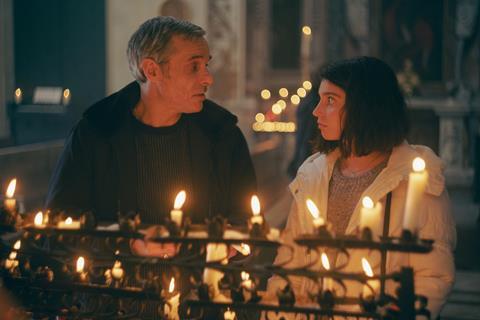Juliette Howell and Harriet Spencer of the UK’s House Productions talk to Screen about collaborating with Rome-based Wildside to produce Mafia drama The Good Mothers — in Italian.

There was plenty of buzz about The Good Mothers, even before it won the inaugural Berlinale Series Award last month.
Here was one of the first European Disney+ dramas, produced by two of Europe’s leading production companies — the UK’s House Productions and Italy’s Wildside — that portrayed the fearsome ‘Ndrangheta, the local Mafia of Calabria, entirely from the women’s perspective.
The Good Mothers was screening with six other titles in contention for the Berlinale Series Award, the first award at an A-list film festival to be established specifically for a series — and was an early favourite for the prize. The jury comments seemed to justify the hype, praising its recreation of an “authentic and detailed world”, and “multi-layered characters” who are allowed “to evolve before our very eyes. We were moved, anxious and, at times, breathless.”
Based on a true story, The Good Mothers is adapted by Stephen Butchard from the book of the same name by Alex Perry. It is the story of three women, born into the ‘Ndrangheta Mafia, who work with a courageous female prosecutor to bring down the criminal organisation from the inside.
For a complex and labyrinthine drama, The Good Mothers’ journey to the screen has been fittingly long. It was one of the first projects to be optioned by House Productions after it was set up in 2016 by former Working Title head of television Juliette Howell and former head of Film4 Tessa Ross. At that stage, it was just a book proposal.
“It was the most extraordinary story that had you gripped through the first couple of pages,” recalls Howell, speaking to Screen International in Berlin just after the series’ world premiere. In January 2018, The New Yorker had run an acclaimed article by Perry headlined ‘Blood and justice’, ahead of publication of his book that summer.
For the script, House teamed with Stephen Butchard, Bafta TV-nominated for writing 2010 BBC miniseries Five Daughters, about the victims of a UK serial killer, and best known for adapting and showrunning the first three seasons of The Last Kingdom. It was the first time House had worked with Butchard but, says Howell, the team had long admired his work. “There is a sensitivity to it, an emotional connection with characters, particularly female characters.”
Butchard got to work right away, before Perry’s book was even published. “We were feeding bits of the book through to Steve as Alex was writing it,” recalls Howell.
At first, the plan was for The Good Mothers to be a film. House, after all, has a track record in both film and TV, with credits spanning series such as Sherwood, Life After Life and Brexit — The Uncivil War, as well as features including Sebastian Lelio’s The Wonder.
Soon, however, it became clear the story was better suited to a series, allowing the script more space to “interrogate the psychology of the characters”, says Howell. “There isn’t just one story — it interweaves a number of women’s stories. So, television is a much easier, more relevant medium.”
The Good Mothers was greenlit by Disney+ as part of its first European Originals slate. “We were keen to find a project for Disney and, funnily enough, Johanna [Devereaux, director of scripted content for EMEA at The Walt Disney Company] had come across the material,” says Howell. “She knew Alex. It was just one of those things — we were chatting about it in a meeting, and [she said], ‘I know that.’”
At this stage, the scripts were in English, and the plan was to make the series in English. But, increasingly, this approach did not feel right. The team wanted to make an authentic series that felt true to the story. It was, after all, based on real-life events. Shooting it in Italian made sense given the greater acceptance and appetite for foreign-language fare by viewers.
Disney introduced House to Italian production company Wildside (part of Fremantle), with credits including TV series My Brilliant Friend and The Young Pope, and movies L’Immensita and The Eight Mountains. The first introduction between the companies was over Zoom, during the pandemic.
“It all made sense,” says Howell. “They speak brilliant English. There is a shared taste, which means when you’re talking scripts throughout the development stage… there was, broadly, absolute consensus.”
Wildside joined when the outline and two episodes had been written and worked closely on the development of the series with House.
Cross-cultural partnership

The Good Mothers executive producer Harriet Spencer describes the process as an experiment in cross-cultural collaboration. Wildside brought Italian production expertise, but also “an intricate understanding of the context” of the story. Equally, House could ask the kind of questions about the story and setting that only outsiders can pose. Wildside’s CEO Mario Gianani and head of international productions Lorenzo Gangarossa took the lead for the Italian company in the partnership.
The translation of the script was a key part of the process, and the team turned to Italian-American novelist Claudia Durastanti. She had grown up in Calabria and understood the cultural nuances of the area and the local dialect.
Casting was clearly crucial, and the team worked with Italian casting director Teresa Razzauti. Casting Italian actors for an Italian-language script might seem to present a major obstacle to an English production company. House, after all, had no sense of the pedigree and profile of the Italian talent who sent in audition tapes, nor those eventually selected for the series. But Spencer recalls it was not as problematic as might be assumed, and that the power of a performance could travel across language. “We would regroup with Wildside, and we would usually have exactly the same reaction,” says Spencer.
Adds Howell: “There was real comfort that we responded exactly like Wildside — there was literally no difference of opinion.”
For the lead roles, they selected Gaia Girace — who starred in the first three series of My Brilliant Friend — in the role of 17-year-old Denise Cosco, the daughter of a Mafia boss, and David di Donatello award-winning actress Micaela Ramazzotti as her mother Lea Garofalo. Barbara Chichiarelli (cult Netflix series Suburra) was cast as prosecutor Anna Colace, while Valentina Bellè and Simona Distefano play Mafia mothers.
Meanwhile, the UK’s Julian Jarrold and Italy’s Elisa Amoruso signed on to direct. Jarrold, whose credits include features Becoming Jane, Kinky Boots and A Royal Night Out as well as series Appropriate Adult and The Crown, was the lead director and took charge of the first three episodes. Amoruso, with film credits including romantic drama Time Is Up and documentaries Chiara Ferragni: Unposted, helmed the final three episodes.
Howell says Jarrold brought an “incredible cinematic vision” and an ability to bring out “an intimacy with his characters”. It was also important to have an Italian director on the project, she says, so Wildside introduced them to Amoruso. The relationship between Jarrold and Amoruso was an important one.
“We were keen they should feel as one,” says Howell. “Julian is a nurturing and very generous director, and so we got them to spend a lot of time together.” She calls it a proper collaboration. Amoruso would contribute from the outset, using her local knowledge of locations and talking through the project with Jarrold.

Production started in January 2022 in Rome, before moving to Calabria and returning to Rome and its outskirts for the final leg.
Italian cinematographer Vittorio Omodei Zorini, whose credits include Mafia tales ZeroZeroZero and Gomorrah, and Spanish DoP Ferran Paredes Rubio (Gomorrah, The Lying Life Of Adults) took charge of episodes one to three, while Martina Cocco, who worked with Amoruso on Time Is Up, lensed the final three episodes.
Filming continued until May. Both Howell and Spencer speak warmly about the experience of shooting in Italy. Asked how it differs from filming with crews in the UK, it becomes clear that it is a subject they have debated at length. “I think it’s something to do with being able to eat lunch outside,” says Howell, with a smile. “It’s easy to joke about these things. But it’s actually very important — all of us sat around the table, and it wasn’t about everyone going to their trailers. It was very different and very special.”
Post-production took place in Rome, with Simona Paggi, Chiara Griziotti and Irene Vecchio taking on editing duties. “We would nip over and watch the cuts,” recalls Howell. “You always want to be in the room as much as you can, rather than doing it remotely. But it also worked remotely as well.”
She explains they always tried to watch the first cut in the room with everybody, so it could be discussed and everyone was on the same page. Then, the subsequent cuts were shared online. “We are all much more comfortable working remotely — partly because everyone has now got the kit to do so,” says Howell.
Berlin spotlight
The House team was back in Berlin with The Good Mothers after a successful launch of Athina Rachel Tsangari’s series Trigonometry at the festival in 2020. At a time when so many TV dramas are being produced and released, Berlinale Series is proving itself as an effective launchpad. Just seven series played in competition at Berlinale Series this year, guaranteeing each one a fair amount of profile.
Spencer says The Good Mothers has sought to bring “a female gaze on the Mafia world”. Butchard, Jarrold and Amoruso all felt very strongly they did not want to “lean into the traditional traits of Mafia TV shows that we’ve seen before”, Spencer adds. “This wasn’t about showing violence on screen. That’s very much in the background. Instead, we see everything from the perspective of the women, who you don’t ever see properly in these stories. They’re kind of invisible.”
From the outset, the ambition was to present a different view of the Mafia from the one that is normally seen by audiences. “There are certain tropes around Mafia films that we are all familiar with,” says Howell. “This was an opportunity to go into a world we think we know, and just see it from a completely different perspective.”
She describes it as a story of ordinary women, who feel utterly relatable, doing extraordinary things. “They are just looking for a better life for their children.”
While the story itself is heartbreaking in many ways, adds Howell, it is also a hopeful one. “It’s all about the possibility of change.”

























No comments yet